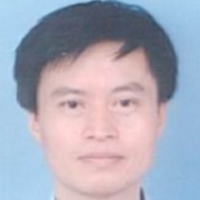
Benxian Xiao
Work place: School of Electrical Engineering and Automation, Hefei University of Technology
E-mail: xiaobenxian@126.com
Website:
Research Interests: Computer systems and computational processes, Solid Modeling, Database Management System, Process Control System
Biography
Benxian Xiao was born on April 4, 1964 in Anhui, China. He received the B.Sc degree and the M.Sc degree and Ph.D. degree in Electrical Engineering and Automation from Hefei University of Technology, Hefei, China, in 1986 and 1989 and 2004, respectively. Since 1989, he has been with the Department of Automation, School of Electrical Engineering and Automation, Hefei University of Technology. Now he is a Professor in Control Theory & Control Engineering Subjects. His current research interests include Intelligent Control, Automotive Steering Control Systems, System Modeling and Simulation.
Author Articles
Research on Modeling and Active Steering Control Algorithm for Electric Forklift Steer-by-Wire System
DOI: https://doi.org/10.5815/ijisa.2016.11.08, Pub. Date: 8 Nov. 2016
In this paper, according to the structure char-acteristics of steer-by-wire (SBW) system for the TFC20 electric forklift, steering dynamics model and two degree of freedom vehicle model are deduced for SBW forklift. Aiming at the free design features of the angular trans-mission characteristics in the SBW system of electric forklift, the theory of active steering control strategy is studied. After analyzing the influence factors of the an-gular transmission ratio of the steering system, the ideal angular transmission ratio is proposed, which is based on the yaw rate gain invariance. Also, the control strategy of the yaw rate feedback and the full state feedback is stud-ied. The simulation results show that the above strategy is effective for the active steering control; it can improve the operating stability and the response speed of the fork-lift.
[...] Read more.Research on Variable Transmission Ratio and Yaw Rate Control Strategy of Electric Forklift Steering-by-Wire System
DOI: https://doi.org/10.5815/ijisa.2016.10.03, Pub. Date: 8 Oct. 2016
Combined with the transmission ratio charac-teristics of forklift steering-by-wire (SBW) system, through the application of fuzzy control technology, the variable transmission ratio function is designed based on the steering handle angle and vehicle speed, and simula-tion analysis of sinusoidal steering is done at low-speed and high-speed. Simulation results show that the fuzzy variable transmission ratio control can make forklift steering light & sensitive at low-speed and steering steady & heavy at high speed, also it can improve the operation stability and reduce the driver’s load. Discuss the relationship between yaw rate and forklift handling stability, propose the yaw rate feedback control strategy based on the fuzzy variable transmission ratio control, and design a fuzzy self-adaptive PID controller. Simula-tion results show that the SBW system based on the fuzzy variable transmission ratio control with yaw rate feedback can accurately and quickly track the desired yaw rate, and reduce or even eliminate the overshoot phenomenon, improve the forklift dynamic performance.
[...] Read more.The Research of Fuzzy Variable Transmission Ratio for Steer-by-wire System of Electric Forklift
By Benxian Xiao
DOI: https://doi.org/10.5815/ijisa.2015.05.05, Pub. Date: 8 Apr. 2015
Combining with the TE30 electric forklift produced by an enterprise, the principle of Steer-by-wire (SBW) system, steering motion state, ideal steering ratio are analyzed and studied. The biggest characteristic of SBW system is that the transmission ratio is free to design. Based on the establishment of two-degree-freedom linear model of Forklift, the paper designed the nonlinear transmission ratio function on vehicle speed and steering angle with the application of fuzzy control rules. The simulation results show that the fuzzy variable transmission ratio can make the yaw velocity gain tend to be constant, also can make Forklift light sensitive at low speeds and steady heavy at high speed. In order to ensure that the yaw velocity gain does not vary with the change of speed and steering angle, this paper presents a dynamic correction control strategy based on the steady-state control for Forklift. The simulation results show that the amplitudes of yaw velocity and sideslip angle are reduced with the dynamic correction of yaw velocity feedback, also the handling stability is improved.
[...] Read more.PID Controller Parameters Tuning Based-on Satisfaction for Superheated Steam Temperature of Power Station Boiler
By Benxian Xiao Jun Xiao Rongbao Chen Yanhong Li
DOI: https://doi.org/10.5815/ijitcs.2014.07.02, Pub. Date: 8 Jun. 2014
Proposed the PID controller parameters tuning method based-on New Luus-Jaakola (NLJ) algorithm and satisfaction idea. According to the different requirements of each performance index, designed the satisfaction function with fuzzy constraint attributes, and then determined the comprehensive satisfaction function for PID tuning by NLJ algorithm. Provided the steps of PID controller parameters tuning based on the NLJ algorithm and satisfaction, and applied this tuning method to the cascade control system of superheated steam temperature for Power Station Boiler. Finally the simulation and experiment results have shown the proposed method has good dynamic and static control performances for this complicated superheated steam temperature control system.
[...] Read more.Research of IGPC Control Strategy Based-on Hybrid Optimization for Power Station Boiler Superheated Steam Temperature
By Benxian Xiao Rongbao Chen Jun Xiao
DOI: https://doi.org/10.5815/ijitcs.2014.02.05, Pub. Date: 8 Jan. 2014
Implicit Generalized Predictive Control (IGPC) algorithm can directly identify controller parameters without the need of solving Diophantine equation, thus can reduce the on-line algorithm computation time. In order to improve IGPC performance and extend its application, modified Particle Swarm Optimization (PSO) algorithm is introduced into IGPC rolling horizon optimization, combined with general IGPC gradient optimization method under unconstrained condition, a new hybrid optimization method is obtained, this modified IGPC can be used to both of the non-constraint industry process control and the constraint industry process control. Aiming at the superheated steam temperature control of sub-critical 600MW boiler, a new cascade compound control strategy that combines an outer loop IGPC master adjuster and an inner loop PID auxiliary adjuster is adopted. Finally the simulation results have shown that the proposed method can constrain the control action, prevent dramatic change of the input signal, thus can achieve good static and dynamic performances.
[...] Read more.Other Articles
Subscribe to receive issue release notifications and newsletters from MECS Press journals